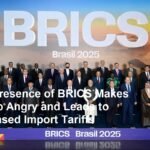Brussels, April 2, 2025 – In a highly anticipated press briefing held this morning, European Commission President Ursula von der Leyen announced that the European Union has finalized a comprehensive strategy to counter the recent decision by the President of the United States to impose steep import tariffs on key industries. The tariffs, targeting steel, aluminum, and automobiles, are expected to have wide-ranging repercussions on global trade and have prompted swift action by EU policymakers.
President von der Leyen emphasized that the EU’s response is the result of meticulous planning and close collaboration with member states over several months. “We have developed a robust plan designed to protect our industries and maintain the stability of our internal market,” she stated. “The tariffs on steel, aluminum, and automobiles not only challenge our economic interests but also threaten the long-standing trade relations between Europe and the United States. Our response is measured, well-prepared, and firmly rooted in our commitment to fair international trade.”
The decision by the US to raise tariffs is seen as a retaliatory measure following a series of high-stakes trade disputes between the two economic giants. American officials argue that the increased tariffs are necessary to protect domestic industries from what they describe as unfair trade practices. However, critics argue that such unilateral measures undermine global trade norms and risk igniting a tit-for-tat escalation that could hurt businesses and consumers on both sides of the Atlantic.
EU officials have expressed concern that the new tariffs could disrupt supply chains and increase production costs across multiple sectors. The steel and aluminum industries, which are vital to European manufacturing, may face reduced competitiveness as production costs rise. The automobile sector, already grappling with a transition toward greener technologies and digitalization, could see further complications in its international supply networks. “Our industries are interconnected with global markets,” noted a senior EU trade official. “A disruption in these sectors can have cascading effects on employment, innovation, and overall economic growth.”
In response to these challenges, the European Commission’s plan includes a series of measures aimed at mitigating the negative impact on European businesses while signaling to the international community that the EU remains committed to a rules-based trading system. Key elements of the strategy involve strengthening diplomatic channels with the United States, exploring legal avenues within the framework of the World Trade Organization, and mobilizing support among allied nations to counterbalance the unilateral tariff policy.
Moreover, the EU is preparing to offer targeted support to industries most vulnerable to the tariff hikes. This support includes financial aid packages, incentives for innovation and modernization, and measures designed to diversify supply chains. “We are working tirelessly to ensure that our industries are not left to bear the brunt of these tariffs alone,” President von der Leyen remarked. “Our approach is proactive and aimed at preserving the competitive edge of European manufacturing and technology.”
The announcement has been met with a mix of cautious optimism and concern across European capitals. Business leaders and trade unions have welcomed the EU’s decisive response, while some experts warn that the long-term effects of a sustained trade conflict could still be significant. “It’s a step in the right direction,” commented an economist based in Frankfurt. “However, we must be prepared for a protracted negotiation process and the possibility of further economic turbulence if the underlying disputes are not resolved.”
As discussions continue between the EU and US officials, the global trading community is closely monitoring the situation. Analysts predict that the outcome of these negotiations could set an important precedent for future trade policies and the balance of power in international economic relations.
In concluding her briefing, President von der Leyen reaffirmed the EU’s commitment to upholding the principles of free and fair trade. “Our plan reflects not only our readiness to defend our economic interests but also our unwavering dedication to a global trading system that benefits all,” she stated. With tensions rising and stakes high, the coming weeks are expected to be critical in shaping the future dynamics of transatlantic trade relations.












